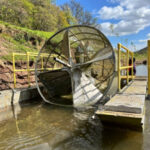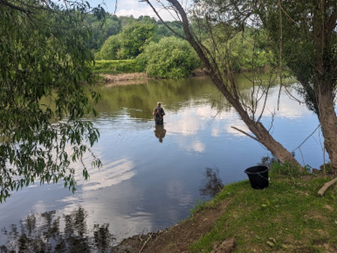Once again, the WSA have been asked to assist with the capture of Salmon Smolts and Shad  by the team at Swansea University headed up by Professor Dave Clarke as part of an ongoing acoustic tagging programme. Last season was such a success that they have doubled the numbers of fish required this time around so we need to recruit as many volunteers as possible to achieve the targets set.
by the team at Swansea University headed up by Professor Dave Clarke as part of an ongoing acoustic tagging programme. Last season was such a success that they have doubled the numbers of fish required this time around so we need to recruit as many volunteers as possible to achieve the targets set.
The project can be divided into two distinct operations, each with its own particular objective and will appeal to both angling and non-angling members.
Phase one involves the deployment of a Rotary Screw Trap (RST) into the main stem of the river at Bigsweir in the first week of April and, as we saw from last year, RST deployment is a big operation so any extra pairs of hands are appreciated.
Managing the RST will likely need a team of minimum 2 people to lower the drum at dusk, and then have a tagging team of minimum 3 people to fish the RST in the early hours of the morning approx. 6am (but could be earlier). Fishing will continue every day that is viable until they reach their goal of 100 smolts so fishing could continue through-out the month of April, dependent on catch.
Once a similar sea trout capture in March on the Tywi is completed, they will likely move that RST into the Monnow to fish there for the rest of the salmon.
Any extra help with fishing the RSTs (lowering the drum or fishing it in the morning) throughout the Spring would be brilliant and very much appreciated. As last year, a rota will be set up with an online calendar available for volunteers to enter their name, contact details and available dates so that the team from Swansea can coordinate and get in touch.
 The second operation will more likely appeal, but not solely, to the larger angling community as it involves the capture, with rod and line, of up to 100 Shad, (fear not, it is under a special licence), during the evenings throughout May.
The second operation will more likely appeal, but not solely, to the larger angling community as it involves the capture, with rod and line, of up to 100 Shad, (fear not, it is under a special licence), during the evenings throughout May.
We fish two primary locations, Aramstone near Hoarwithy and Llyswen on the road towards Builth with a possibility of the Golden Mile as a third/reserve venue.
Wading at Aramstone provides better access to the shoals as they migrate by but Llyswen can be fished directly off the gravel bank into a holding pool. We also found that Light Spinning tactics were more profitable but I’m not sure if a team of flies could prove to be just as successful if cast by a proficient rod!
The tagging is carried out by the team from Swansea University but all hands are welcome to assist with this phase of the process too. Another opportunity to get hands on, literally, with a worthwhile conservation derived project.
Once again, there will be a rota accessible to complete online and volunteers will be contacted to confirm their availability and to receive the latest information.
For some of us, this was the perfect end to a day struggling to connect with the larger species of tourist in the river and, with this in mind, Swansea University are also keen to distribute their “Anglers Log Books” for those lucky enough to catch Salmon, Sea Trout or Brown Trout throughout the season. In the pack, there is the logbook itself, scale packets to take a scale sample from a few fish, and an envelope ready with a stamp to return the logbook at the end of the season. This will help get background data on the age and population size of mature fish in the system.
For further information on all the above projects, please feel free to contact your Membership Secretary, Lawrence Birkin at membership@wyesalmon.com Smolt are recovered from the RST in the early hours of the morning and Shad are caught in the evenings, tranquilized before the insertion of an acoustic tag and then allowed to go on their way.
100% of those Shad tagged at Aramstone (40) survived to migrate to the sea and we await their return this season.
